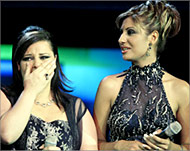New reality TV dazzles Arab youth
A new reality TV programme, “Star Academy,” in which female and male Arab teenagers live together for a talent contest is proving a big hit among the young in the Middle East, despite sharp criticism from conservative circles.

The show, a copy of a French programme of the same name and launched last month by the private Lebanese Broadcasting Corporation International (LBCI), groups 16 young people selected from around the Arab world.
Aired on a 24-hour channel carried on Arabsat, it is a first for the region, where private lives are taboo subjects and sexual segregation remains the norm.
Each week, one of the candidates is voted out following training sessions in singing, acting and dance choreography.
Pan-Arab participants
The stardom-seeking candidates come from Lebanon, Syria, Tunisia, Morocco, Egypt, Kuwait, Saudi Arabia and the United Arab Emirates, and are housed in a villa in Adma, in the hills northeast of Beirut.
According to the Stat-Ipsos statistics institute, the ratings of Star Academy have reached 80 per cent among Lebanese viewers aged between 15 and 25 years old.
A study is still underway for ratings in the Arab world, but results are expected to be as high, given the tens of thousands of votes received via email or mobile phone messages from various Arab states, according to the organisers.
Last Friday’s episode was a real thriller, with Lebanese fans
flocking to welcome visiting candidates from the French Star
Academy, Sophia and Patxi.
“It is great to be welcomed in such a way and to know that we are so popular on the other side of the Mediterranean,” said French-Basque Patxi, as security forces fought to keep the fans away.
Angry voices
 |
|
Superstar show was criticised by |
But the popularity of the show does not please everyone in Lebanon and the Arab world. “It is indecent to make young Arabs, girls and boys, live together. The devil may be there,” said Muslim shaikh, Samir Zaini.
And political analyst Khaldun Sulh said such programmes were “not so innocent.”
“They are meant to keep Arab youth away from national causes at a time that Iraq is occupied by imperialism and when Palestine continues to bleed,” he said.
In October, Muslims in Kuwait tried to block a concert for young Arab musicians selected by Lebanon’s Future Television, which is owned by Prime Minister Rafiq Hariri.
Muslims in the southern Lebanese port city of Sidon have also demonstrated against parliamentarian Bahia Hariri, the billionaire prime minister’s sister, for organising a concert of winners of the Arab Superstar television programme.
The highly-popular programme was won by Diana Karazon, a Jordanian who was congratulated for her success by the country’s monarch.
Ignoring criticism
|
“I used to think that all young Arabs from the Gulf were fundamentalists. I realised that they are like us. They are open to the world but it is forbidden for them to express themselves at home” Elsa, Star Academy fan |
But many youngsters in Lebanon shrug off the criticism. “Is it wrong to watch young people sing, dance and get to know each other?” wondered 16-year-old Elsa.
“I used to think that all young Arabs from the Gulf were fundamentalists. I realised that they are like us. They are open to the world but it is forbidden for them to express themselves at home,” she said.
“This programme for the first time has given Arab youth the chance to vote for other people than the dinosaurs who govern them,” added Umar, 24.